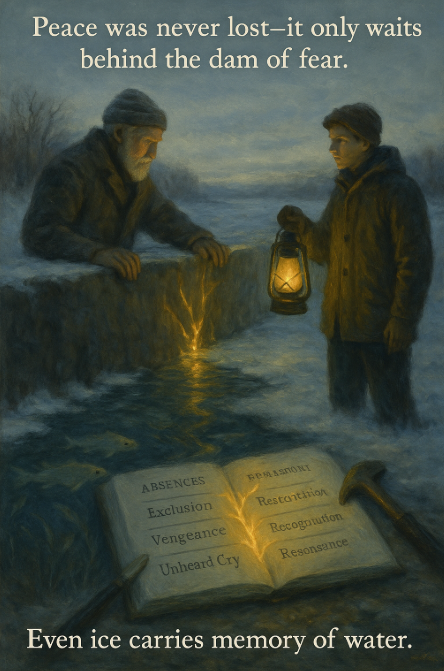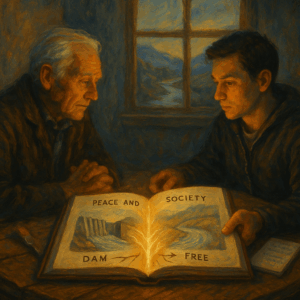
The greenhouse was nearly empty that night, its shelves stripped bare except for a few glass jars and a faint scent of basil. Frost webbed across the patched panes like veins of white ink, and the lantern on the table burned low, its flame wavering with each draft. The ledger lay open before Emil, its pages untouched.
Outside, snow whispered against the glass, and all of Crestview seemed to hold its breath. The Circle had finished packing—paintbrushes, canopy frames, quiet boxes—yet Emil remained, staring at the blank page that refused to begin.
He heard Grandfather Tomas before he saw him: the slow, sure rhythm of his cane, a sound of patience shaped by years. He entered quietly, his scarf dusted with snow, holding two mugs of tea that steamed in the cold air.
“The silence feels heavier tonight,” Tomas said, setting one mug down.
Emil nodded, his eyes fixed on the page. “It’s the waiting,” he said softly. “The tickets are booked. The Council approved the funds. We leave March first. But I don’t know if I’m ready.”
Grandfather sat across from him. “No one is ready for peace, Emil. Readiness isn’t certainty—it’s the ability to stand without bitterness when the unexpected arrives. Peace is not a skill; it’s a posture.”
Emil turned the pen in his hand. “But what if we make things worse? What if our words sound hollow there, or our murals offend people who’ve already lost too much?”
Tomas rested his hands on the table, fingers tracing the old grain. His voice was calm, almost like a prayer.
“Peace isn’t built, Emil—it’s released. Think of a river. When a dam blocks it, the water grows restless. The pressure builds, not because the river hates the wall, but because it remembers movement. Societies are the same. When fear, pride, or vengeance block their flow, conflict isn’t born—it’s revealed. Violence is the overflow of what was meant to move freely.”
He lifted the mug, the steam rising between them like mist.
“When you remove the dam—even a little—the river doesn’t need instruction. It remembers its path. It returns to balance. Peace is that way. You don’t create it; you remove what obstructs it.”
Emil looked up, absorbing the words. “So our work in Kyiv isn’t to teach peace, but to clear what keeps it from flowing?”
Grandfather smiled. “Exactly. You’re not engineers of harmony—you’re gardeners of renewal. Each mural, each box, each circle removes a stone from the current. You don’t command the water; you make room for its remembering.”
Emil nodded, slowly but with clarity. “Still,” he said, “it feels like we’re giving away pieces of ourselves everywhere we go. Every project, every cause—it’s like scattering parts of our own heart. When does it end?”
Tomas leaned back, his breath fogging the air. “It doesn’t. But that isn’t loss, Emil—it’s multiplication. The gardener’s heart doesn’t shrink with planting; it multiplies in what grows. The more you give, the wider the river becomes.”
Emil’s voice lowered. “And if the forest burns again? If everything we build gets washed away?”
Grandfather’s eyes glowed with the lanternlight. “Then the river still runs beneath the ashes. The roots remember the direction of flow. What you build isn’t for permanence—it’s for pattern. If one bank crumbles, another will learn to hold the current. That’s how life keeps teaching itself.”
The greenhouse was quiet again. The lantern flickered, catching the frost and turning it briefly to gold.
Grandfather rose, resting his hand on Emil’s shoulder. “Do not fear loss. Even endings are forms of planting. The river never stops—it only pauses under ice.”
For a long moment, the only sound was the wind brushing against the glass. Then Emil dipped his pen into ink and began to write—not to complete the page, but to honor the stillness before movement.
When he finished, he closed the ledger, exhaling softly. Grandfather smiled, his eyes kind and certain.
“Remember, Emil,” he said as he turned to leave,
“faith is not the absence of doubt—it’s the endurance to outlast it.
When you walk into Kyiv, don’t bring answers—bring clearings.”
Ledger Entry — The Weight of Choice
Date: February 27, 2026
Symptom: Fear of unpreparedness before global deployment.
Disease — The Four Absences (Internal):
-
Absence 1 (Exclusion): Doubt isolates conviction.
-
Absence 2 (Vengeance): Fear of failure turns inward as self-punishment.
-
Absence 3 (Dehumanization): Self reduced to duty, not purpose.
-
Absence 4 (Unheard Cry): Inner voice silenced beneath responsibility.
Investigator’s Response:
Dialogue with Grandfather; peace reframed as natural flow rather than forced construction. Resolved to act as facilitator, not commander.
Outcome:
Emotional posture aligned with humility; readiness redefined as capacity to release, not to control.
Note:
Even ice carries memory of water. Endurance is simply faith in the thaw.
As the lantern dimmed, the frost outside began to glisten with faint light — not from the moon, but from the first hint of dawn. Emil whispered,
“If endings are seeds, then thaw is the river remembering its path.”


